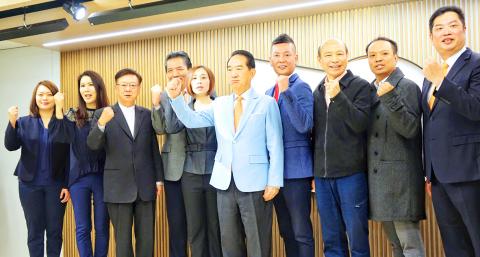Hon Hai Precision Industry Co founder Terry Gou’s (郭台銘) bid for the presidency has ended, but his influence on national politics is to continue as two aides and a friend were added yesterday to the People First Party’s (PFP) list of legislator-at-large nominees.
The party’s top nominees, from No. 1 to No. 10, are League for Persons with Disabilities secretary-general Eva Teng (滕西華), PFP Legislator Lee Hung-chun (李鴻鈞), United Microelectronics Co honorary vice chairman John Hsuan (宣明智), Yonglin Foundation chief executive director Amanda Liu (劉宥彤), PFP Legislator Chen Yi-chieh (陳怡潔), former Chinese Nationalist Party (KMT) legislator Chang Sho-wen (張碩文), former Mackay Memorial Hospital vice president Shih Shou-chuan (施壽全), retired Armed Forces Reserve Command major general Lee Hai-tung (李海同), Yonglin Foundation deputy executive director Evelyn Tsai (蔡沁瑜) and Kao Han-nan (高翰男), an Aborigine with a doctorate in music.
Nominees No. 11 to No. 22 include those of Hakka ancestry, travel industry representatives, academics and young entrepreneurs.

Photo: Liu Hsin-de, Taipei Times
Tsai and Liu work at the Yonglin Foundation, which was created by Gou to carry out educational initiatives nationwide.
Hsuan, whom PFP Chairman James Soong (宋楚瑜) called the “godfather of Taiwan’s high-tech industry,” is one of Gou’s close friends.
Asked why he agreed to be nominated, Hsuan said that Gou’s participation in the KMT presidential primary played a major role in his decision.
“Gou told me that he has dedicated himself to the nation and asked me what I have done for Taiwan,” Hsuan said.
“We both feel that politics is the greatest public good, and that it should be promoted through good policies. Good policies must be introduced at the Legislative Yuan, where legislators propose what they want the government to do. This is why I agreed to be nominated,” he added.
Asked if he spoke on Gou’s behalf, Hsuan said that he spoke for himself and for the nation’s tech industry, adding that he hopes that Taiwan’s advancements in biotechnology, information and communications technology, and other industries can be marketed worldwide, and that the government will use technology to improve the nation’s future.
Liu said that she would represent Gou’s will and the will of the people.
She would speak up for start-ups and focus on education, Liu said, adding that these issues are not necessarily on Gou’s agenda.
Gou had left his mark by making full government subsidies for children aged six and younger one of his key campaign promises, Liu said, adding that the public agrees with that pledge.
Teng — an advocate for healthcare, long-term care issues and people with physical challenges — said she always considered politics a grinding business, but added that she has dealt with politicians as a lobbyist for 25 years.
“As a social worker, I realize that the difficulties facing socially disadvantaged people cannot be solved by themselves alone,” Teng said. “They need to be solved through regulation and policy changes. People say we are only doing things for them, but everything that we have done over the past two decades is for us and our families’ futures.”

The Ministry of Economic Affairs has fined Taobao NT$1.2 million (US$36,900) for advertisements that exceeded its approved business scope and ordered the Chinese e-commerce platform to make corrections in the first half of this year or its license would be revoked. Lawmakers have called for stricter supervision of Chinese e-commerce platforms and more stringent measures to prevent China from laundering its goods through Taiwan as US President Donald Trump’s administration cracks down on origin laundering. The legislature’s Finance Committee yesterday met to discuss policies to prevent China from dumping goods in Taiwan, inviting government agencies to report on the matter. Democratic Progressive Party

Taiwan and its Pacific ally Tuvalu on Tuesday signed two accords aimed at facilitating bilateral cooperation on labor affairs, according to Taiwan’s Ministry of Foreign Affairs (MOFA). The governments inked two agreements in Taipei, witnessed by Foreign Minister Lin Chia-lung (林佳龍) and visiting Deputy Tuvaluan Prime Minister Panapasi Nelesone, MOFA said in a news release. According to MOFA, the agreements will facilitate cooperation on labor issues and allow the two sides to mutually recognize seafarers’ certificates and related training. Taiwan would also continue to collaborate with Tuvalu across various fields to promote economic prosperity as well as the well-being of their

Taiwan would welcome the return of Honduras as a diplomatic ally if its next president decides to make such a move, Minister of Foreign Affairs Lin Chia-lung (林佳龍) said yesterday. “Of course, we would welcome Honduras if they want to restore diplomatic ties with Taiwan after their elections,” Lin said at a meeting of the legislature’s Foreign Affairs and National Defense Committee, when asked to comment on statements made by two of the three Honduran presidential candidates during the presidential campaign in the Central American country. Taiwan is paying close attention to the region as a whole in the wake of a

NEW WORLD: Taiwan is pursuing innovative approaches to international relations through economics, trade and values-based diplomacy, the foreign minister said Taiwan would implement a “three-chain strategy” that promotes democratic values in response to US tariffs, Minister of Foreign Affairs Lin Chia-lung (林佳龍) said. Taiwan would aim to create a “global democratic value chain,” seek to capitalize on its position within the first island chain and promote a “non-red supply chain,” Lin was quoted as saying in the ministry’s written report to the Legislative Yuan submitted ahead of the legislature’s Foreign Affairs and National Defense Committee meeting slated for today. The Ministry would also uphold a spirit of mutual beneficial collaboration, maintaining close communication and consultations with Washington to show that Taiwan-US cooperation